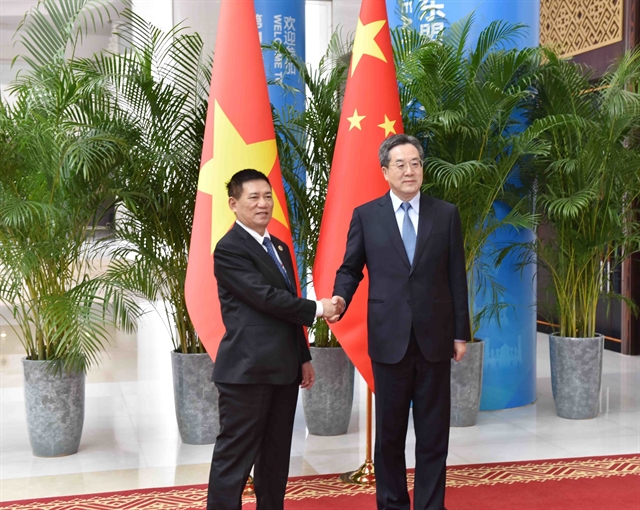 Politics & Law
Politics & Law


|
| Deputy Prime Minister Hồ Đức Phớc (left) meets Chinese Vice Premier Ding Xuexiang on Tuesday. — VNA/VNS Photo |
NANNING — The Vietnamese Party, State and people always consider the consolidation and development of relations with China as a strategic choice and leading priority in the country’s foreign policy, and want to join hands with China to develop the ties in a more stable, sustainable and healthier manner, Deputy Prime Minister Hồ Đức Phớc has said.
Phớc made the statement while holding talks with Chinese Vice Premier Ding Xuexiang on the sidelines of the 21st China–ASEAN Expo (CAEXPO) and China–ASEAN Business and Investment Summit (CABIS) in Nanning city in the Guangxi Zhuang Autonomous Region on September 24.
He recommended the two sides to work closely to well arrange high-level visits and meetings, effectively implement important exchange mechanisms between the two Parties and States in the coming time, and foster practical cooperation in various areas, particularly railway and road infrastructure connectivity.
The Deputy PM urged the Chinese Government to support Việt Nam to soon carry out the feasibility study for the Lào Cai–Hà Nội-Hải Phòng standard gauge railway as well as sketch out planning schemes for the Lạng Sơn-Hà Nội and Móng Cái-Hạ Long-Hải Phòng rail routes.
Phớc expressed his hope that China will continue opening its door for Vietnamese agricultural and aquatic products, encourage Chinese enterprises to make quality, effective and high-tech investment in Việt Nam, and implement activities to step up friendship exchanges as well as cooperation in the fields of culture, education, aviation and tourism.
He also proposed the two sides coordinate to well manage the land border, strictly implement the agreements and common perceptions reached by high-ranking leaders of the two Parties and States, maintain peace and stability at sea, and better control and settle disagreements at sea in accordance with international law and the 1982 United Nations Convention on the Law of the Sea (UNCLOS).
Ding, for his part, stressed that as Việt Nam and China are friendly neighbours, China persistently supports Việt Nam's economic development and national modernisation on the socialist path in line with its situation.
Appreciating Phớc’s cooperation recommendations, Ding affirmed that the Chinese Party and Government regard the relations with Việt Nam as a prioritised direction in the country’s neighbourhood diplomacy.
He expressed his hope that the two sides will continue maintaining high-level meetings, enhancing political trust, promoting practical cooperation areas, expanding humanistic exchanges, consolidating the traditional friendship, well controlling disagreements, and joining hands to build the Việt Nam-China community with a shared future that carries strategic significance under the common perception reached by high-ranking leaders of the two Parties and States.
The two sides expressed their pleasure and appreciation for the positive development in the relations between the two Parties and States over the past time, particularly the historic visits by their top leaders during which they set out strategic orientations for the development of the bilateral ties, established a new positioning, elevated the comprehensive strategic cooperative partnership, and agreed to build a community with a shared future that carries strategic significance.
They also agreed to enhance directions for ministries, sectors, and localities to implement and concretise the high-level agreements and common perceptions, strengthen practical cooperation in various fields, and develop the bilateral ties in a more stable, sustainable and healthier manner.
The same day, Phớc hosted receptions for the President of Huwei Asia–Pacific and leaders of the China Energy Engineering Corporation (CEEC) and Power Construction Corporation of China (Power China). — VNS




